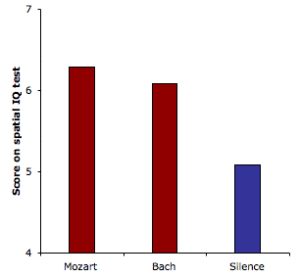The Mozart Effect is commonly described as “he ability of Mozart’s music to temporarily heighten listeners’ spatial awareness and intelligence, to improve listeners’ concentration and speech abilities, and to advance reading and language skills”. So does it actually work? A book written by Don Campbell focuses on the development on children’s brains fro m Mozart music, from before birth to ages 8-10. In the book there is no clear conclusion drawn. This is probably because holding an experiment where you could potentially be inebriating a child from learning/getting smarter is unethical. Intelligence cannot be proven because as children get older, they also get smarter. Though you could compare the IQ’s of the children in a control group to the experimental group.
m Mozart music, from before birth to ages 8-10. In the book there is no clear conclusion drawn. This is probably because holding an experiment where you could potentially be inebriating a child from learning/getting smarter is unethical. Intelligence cannot be proven because as children get older, they also get smarter. Though you could compare the IQ’s of the children in a control group to the experimental group.
Rudi Črnčec, Sarah J. Wilson & Margot Prior say in their book The Cognitive and Academic Benefits of Music to Children: Facts and fiction that the effects of the Mozart Effect can not be reliably shown- the Mozart Effect has only shown an impact on reasoning skills. The Mozart Effect has so far shown no impact on normal kids in the academic field. However when it comes to kids with special needs, listening to classical music calms them down which in turn enhances learning. So there is an area to research more, the impact of classical media with those who suffer from mental disabilities.
Walter Verrusio, Evaristo Ettorre, Edoardo Vicenzini, Nicola Vanacore, Mauro Cacciafesta and Oriano Mecarelli did a study on the Mozart Effect on adults. They took young healthy adults and healthy elderly and elderly suffer from Mild Cognitive Impairment and played Fur Elise by them. The impact of this was “an increase of alpha band and median frequency index of background alpha rhythm activity (a pattern of brain wave activity linked to memory, cognition and open mind to problem solving) was observed both in Adults and in Elderly”. No changes were detected with those who suffered from MCI. This study was compared to one done with the same people but after they listened to Beethoven, the conclusion from that study was that there were no changes in alpha rhythm. So overall, from this experiment the conclusion drawn was that Mozart’s songs heightened SOME of the listeners intelligence level.
A problem with this whole concept in general though is the file drawer problem. Everyone  wants this theory to be true, so if someone doesn’t fit this idea, it’s not going to be reported. Another problem is that it’s not like you can do a double blind experiment to compare those who listen to Mozart and those who do not, when you play music, the listener will know. Plus as mentioned before, if this were done, it would be unethical to the individuals not receiving Mozart’s music. Unlike the cancer treatments where there is a 50/50 chance of it having a positive impact, this could potentially hold back the participants learning abilities. Looking at the graph to the side, it shows that there is an increase of IQ when listening to classical music, but there are still so many confounding factors. What if the participant normally listens to music before a test and is now forced to sit in silence? That could be a confounding factor- along with what were the participants IQ scores before they listened to the music? This graph just shows IQ scores after listening, even if the groups were properly randomized theres still a chance that people with higher IQ scores ended up in the Mozart and Bach sections of the study.
wants this theory to be true, so if someone doesn’t fit this idea, it’s not going to be reported. Another problem is that it’s not like you can do a double blind experiment to compare those who listen to Mozart and those who do not, when you play music, the listener will know. Plus as mentioned before, if this were done, it would be unethical to the individuals not receiving Mozart’s music. Unlike the cancer treatments where there is a 50/50 chance of it having a positive impact, this could potentially hold back the participants learning abilities. Looking at the graph to the side, it shows that there is an increase of IQ when listening to classical music, but there are still so many confounding factors. What if the participant normally listens to music before a test and is now forced to sit in silence? That could be a confounding factor- along with what were the participants IQ scores before they listened to the music? This graph just shows IQ scores after listening, even if the groups were properly randomized theres still a chance that people with higher IQ scores ended up in the Mozart and Bach sections of the study.
In the end though, my opinion around this concept is that it doesn’t hurt to listen to some Mozart when studying, so far no negative impacts have been shown, and I like to listen to music when studying. So why not, it won’t be the worst thing to try something new like this.

That’s really interesting to hear, but at the same time it makes sense. In my opinion you learn better from other people. There was a blog post that someone else did on learning a language. The author writes about how you learn a language better by discovering it rather than just forcing yourself upon it. Thanks for bringing that really interesting point up!!
Your blog made me think of a topic we talked about in one of my Human Development and Family Studies class. Although the studies you discussed did not have a definitive answer, those that we discussed in my class did. The topic we went over was the Baby Einstein videos that claim that children, young children, that watch them get a jump start on their education, reading abilities, etc. However it was found that the videos have negative impact on what they claimed to improve. It was found that kids who instead of watching the videos had face to face interactions with adults had better reading, and other like skills.